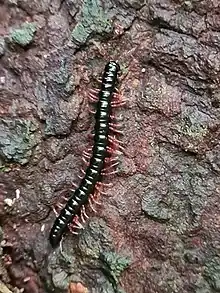Heterocladosoma bifalcatum
Heterocladosoma bifalcatum is a common species of millipede found in eastern Australia.[1]
| Heterocladosoma bifalcatum | |
|---|---|
 | |
| Scientific classification | |
| Kingdom: | |
| Phylum: | |
| Class: | |
| Order: | |
| Family: | |
| Genus: | Heterocladosoma |
| Species: | H. bifalcatum |
| Binomial name | |
| Heterocladosoma bifalcatum (Silvestri, 1898) | |
| Synonyms | |
| |
Description
This millipede has a striking colouration: the body is blackish-brown while the legs, antennae and sternites are red. It can be distinguished from other Heterocladosoma by: the largest tibiotarsal branch apically tapering and curving widely laterad; the telopodite of the gonopods being narrow in profile; and the femoro-solenomerite being almost straight.[2][3]
Behaviour
Heterocladosoma bifalcatum can be found in log debris on the ground and also under the bark of trees. The species is most active during overcast/rainy weather and in the early morning.[3]
External links
- Australia, Atlas of Living. "Species: Heterocladosoma bifalcatum". bie.ala.org.au. Retrieved 2022-09-07.
- Jeekel, C. A. W. (January 1987). "Millipedes from Australia, 11: Australiosomatini from Queensland (Diplopoda, Polydesmida, Paradoxosomatidae)". Beaufortia. 37 (2): 11–41.
- Rowe, Melissah; Sierwald, Petra (2006). "Morphological and systematic study of the tribe Australiosomatini (Diplopoda: Polydesmida: Paradoxosomatidea: Paradoxosomatidae) and a revision of the genus Australiosoma Brölemann". Invertebrate Systematics. 20 (5): 527. doi:10.1071/IS05034.
This article is issued from Wikipedia. The text is licensed under Creative Commons - Attribution - Sharealike. Additional terms may apply for the media files.